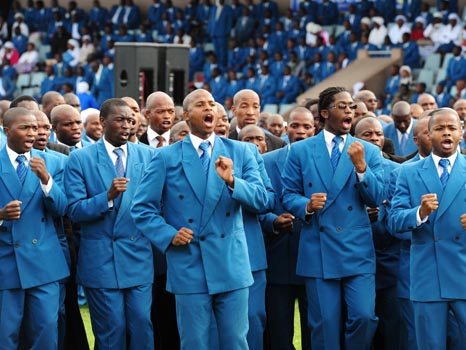
Subscribe to Sipho’s Weekly Political Newsletter.
More political parties will contest the 2019 national elections than ever before – 48, to be exact. Amongst the crop of hopefuls are a number of explicitly Christian parties. Or perhaps church identitarian parties, running on a platform of bringing the Sunday service experience to national politics.
The Daily Vox profiled two such parties recently: Bishop Timothy Ngcobo’s African Freedom Revolution, and the African Transformation Movement, founded by the South African Council of Messianic Churches in Christ (SACMCC).
This is not terribly surprising for a majority-Christian country. (According to the 2001 census, the last to ask about religion, 80% of South Africans identify as Christian.)
Political analyst Ralph Mathekga said that churches are readymade for political mobilisation. “The church easily brings in money as members donate from the heart, making it very attractive for churches to form their own political parties. Since the medieval ages,the church has always been a direct layer in politics. In the case of South Africa, social and economic distribution, and rampant crime with helplessness makes the church a very attractive platform for seeking answers, and perhaps a political solution,” he said.
However, this is not a uniquely South African phenomenon.
Sithembile Mbete, a political analyst with the University of Pretoria, said that the trend of increasing political parties in South Africa reflects a broader global trend: people are looking for alternatives as dominant political parties suffer from a legitimacy crisis.
“Politics has become an increasingly contested space, and in that environment, several actors are taking the opportunity,” she said.
The African National Congress (ANC) has been battered by repeated scandals ranging from corruption to incompetence, to a morally questionable leader in Jacob Zuma. The Democratic Alliance (DA) is not scandal-free where it governs either. Surveys have shown that confidence in the government is very low amongst South Africans.
In such a situation, a bishop may look at their congregations – often numbering well into the tens of thousands – and think that it is quite possible for them to start their own viable parties.
“Part of the decline of legitimacy is a sense of moral decline. People look at corruption for example, and they find themselves attracted to morality pitches in politics,” Mbete said.
Something we’ve discussed before in this newsletter – it does not take that a massive number of votes to secure a seat in the National Assembly, thanks to the proportional representation system in our parliament. (Depending on turnout, 23,000 votes may give you a seat in the 6th parliament.) Clearly civic organisations out there are making the calculation – the National Union of Metalworkers of South Africa (Numsa) is contesting the elections too, as the Socialist Revolutionary Workers’ Party for example – so it isn’t so far fetched that Christian leaders are realising that their power in religious formations can translate to political power.
This Week In Politics
We profile former ANC MP Makhosi Khoza’s new political adventure, the African Democratic Change party. [SHAAZIA EBRAHIM]
Julius Malema visited the Durban University of Technology during his KwaZulu Natal election campaign tour. [LIZEKA MADUNA]
Political parties have been releasing election campaign advertisements. We look at the efforts by the ANC, DA, EFF and Freedom Front Plus. [FATIMA MOOSA]
We reported on the protests which took place in Alexandra last week. The Johannesburg executive mayor Herman Mashaba had a torrid time of it when he visited the township. [SHAAZIA EBRAHIM]








